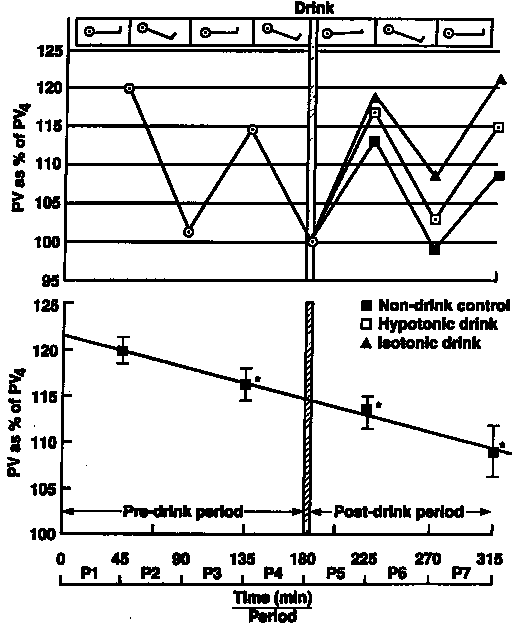
Hinghofer-Szalkay
HG, Sauseng-Fellegger G, Greenleaf JE
Plasma
volume with alternating tilting: effect of fluid ingestion
J Appl Physiol.
1995; 78: 1369-73
- Institute of
Adaptative and Spaceflight Physiology, Graz, Austria
- Institute of
Physiology, School of Medicine, Karl-Franzens-University
Graz, Austria
- Laboratory
for Human Environmental Physiology, National Aeronautics
and Space Administration, Ames Research Center, Moffett
Field, California, USA

 Purpose: The study
determines the effect of repeated 70º head-up tilt (HUT) on
plasma volume (PV) shifts by measuring blood density (BD), plasma
density (PD), and hematocrit (Hct). Eight men (18-26 yr)
underwent a predrink period with two supine (P1 and P3) and two
HUT (P2 and P4) phases of 45 min each. At the end of P4 they
drank 10 ml/kg body wt of isotonic (290 mosmol/kg) sodium
chloride (Iso) or hypotonic (<10 mosmol/kg) unsweetened tea
(Hypo) or nothing [control (Con)]. The following periods
continued the supine (P5, P7)/ upright (P6) sequence. BD and PD
were measured from ear lobe blood; they were different
(P<0.05) between Con, Hypo, and Iso P6 and P7.
Purpose: The study
determines the effect of repeated 70º head-up tilt (HUT) on
plasma volume (PV) shifts by measuring blood density (BD), plasma
density (PD), and hematocrit (Hct). Eight men (18-26 yr)
underwent a predrink period with two supine (P1 and P3) and two
HUT (P2 and P4) phases of 45 min each. At the end of P4 they
drank 10 ml/kg body wt of isotonic (290 mosmol/kg) sodium
chloride (Iso) or hypotonic (<10 mosmol/kg) unsweetened tea
(Hypo) or nothing [control (Con)]. The following periods
continued the supine (P5, P7)/ upright (P6) sequence. BD and PD
were measured from ear lobe blood; they were different
(P<0.05) between Con, Hypo, and Iso P6 and P7.
Results: The density of
fluid that moved between intra- and extravascular compartments
was 1,008.2 ± 0.4 g/l and did not differ with test situations.
In Con (P3, P5, P7), supine PV steadily decreased compared with
P1 (P<0.05). PV in P1, P2, and P3 of all treatments averaged
120 ± 1, 101 ± 1, and 115 ± 1%, respectively, of PV in P4.
Tilt induced PV shifts ranged from -9.7 to -16.7% compared with
PV during the respective previous phases. After drinking, PV
increased (P<0.05) above Con values at the end of P7 by 12.9%
with Iso and by 6.6% with Hypo.
Progressive hemoconcentration
occurred in the nondrink supine periods isotonic saline ingestion
increased supine PV to Con level but did not stop or reverse the
decrease of upright hemoconcentration. Upright blood and PD were
not altered with repeated HUT, which resulted in decreased fluid
loss in consecutive upright periods.
Conclusion: This indicated
that with repeated tilting, upright capillary pressure balance is
achieved with attenuated PV loss.
Figure:
Plasma volume
(PV) change
as % of PV in phase 4 during pre- and postdrink periods
(means ± SE). Nondrink volumes at phases 3, 5, and 7 were
lower than volume at phase 1.


![]()
 Purpose: The study
determines the effect of repeated 70º head-up tilt (HUT) on
plasma volume (PV) shifts by measuring blood density (BD), plasma
density (PD), and hematocrit (Hct). Eight men (18-26 yr)
underwent a predrink period with two supine (P1 and P3) and two
HUT (P2 and P4) phases of 45 min each. At the end of P4 they
drank 10 ml/kg body wt of isotonic (290 mosmol/kg) sodium
chloride (Iso) or hypotonic (<10 mosmol/kg) unsweetened tea
(Hypo) or nothing [control (Con)]. The following periods
continued the supine (P5, P7)/ upright (P6) sequence. BD and PD
were measured from ear lobe blood; they were different
(P<0.05) between Con, Hypo, and Iso P6 and P7.
Purpose: The study
determines the effect of repeated 70º head-up tilt (HUT) on
plasma volume (PV) shifts by measuring blood density (BD), plasma
density (PD), and hematocrit (Hct). Eight men (18-26 yr)
underwent a predrink period with two supine (P1 and P3) and two
HUT (P2 and P4) phases of 45 min each. At the end of P4 they
drank 10 ml/kg body wt of isotonic (290 mosmol/kg) sodium
chloride (Iso) or hypotonic (<10 mosmol/kg) unsweetened tea
(Hypo) or nothing [control (Con)]. The following periods
continued the supine (P5, P7)/ upright (P6) sequence. BD and PD
were measured from ear lobe blood; they were different
(P<0.05) between Con, Hypo, and Iso P6 and P7.